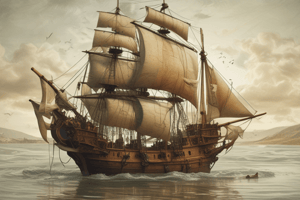Podcast
Questions and Answers
What do tools like alliteration, assonance, and repetition contribute to in a poem?
What do tools like alliteration, assonance, and repetition contribute to in a poem?
- Overall effect of the poem (correct)
- Plot structure
- Character development
- Setting description
What aspect of literature always demonstrates high levels of craftsmanship?
What aspect of literature always demonstrates high levels of craftsmanship?
- Plot structure
- Theme
- Setting
- Character development (correct)
Which poet is NOT mentioned as a contributor to the evolution of English poetry?
Which poet is NOT mentioned as a contributor to the evolution of English poetry?
- Emily Dickinson
- Robert Frost (correct)
- Maya Angelou
- John Keats
Which critical perspective offers insights into how we interpret texts based on historical context?
Which critical perspective offers insights into how we interpret texts based on historical context?
What do poetry and literature form crucial components of in the English language?
What do poetry and literature form crucial components of in the English language?
What is the main purpose of literature, regardless of genre?
What is the main purpose of literature, regardless of genre?
What is the primary reason why poetry is often considered the highest form of literary expression?
What is the primary reason why poetry is often considered the highest form of literary expression?
Which aspect differentiates poetry from other forms of literature?
Which aspect differentiates poetry from other forms of literature?
In what ways do poets make their poems memorable?
In what ways do poets make their poems memorable?
What is a fundamental element used by poets to evoke powerful images in readers' minds?
What is a fundamental element used by poets to evoke powerful images in readers' minds?
Which of the following genres is NOT included under literature?
Which of the following genres is NOT included under literature?
What does the English poetic tradition trace back to during the Middle Ages?
What does the English poetic tradition trace back to during the Middle Ages?
Flashcards are hidden until you start studying
Study Notes
English is a fascinating language with deep roots in history, culture, and art. In this article, we'll delve into two specific aspects of English—Poetry and Literature. Poetry is often considered the highest form of literary expression because it communicates emotions and ideas through skillful use of imagery, metaphors, and symbolism. On the other hand, literature encompasses a wide variety of genres including fiction, nonfiction, drama, and poetry itself. It reflects society, culture, morality, politics, human nature, and universal experience. Let's explore these two facets of English in more detail.
Poetry
Poetry has been around since ancient times, with its earliest forms appearing over thousands of years ago in various cultures worldwide. The English poetic tradition began during the Middle Ages with Anglo-Saxon verse, which was later influenced by French, Latin, Greek, and Italian influences. Here are some key features that define English poetry:
-
Meter and Rhyme: Many poems follow a specific meter, such as iambic pentameter, and use end rhymes to create rhythm and melody. This can help convey emotions and make the poem memorable.
-
Imagery and Symbolism: Poems often employ vivid descriptions and figurative devices like similes, metaphors, and personification to evoke powerful images in readers' minds. These are fundamental elements used by poets from different eras to express their thoughts effectively.
-
Structural Devices: Tools like alliteration, assonance, consonance, repetition, and wordplay contribute to the overall effect of the poem. They may also serve thematic purposes, reinforcing important concepts within the text.
Throughout history, numerous great poets have contributed significantly to the evolution of English poetry, including William Shakespeare, John Keats, Emily Dickinson, T. S. Eliot, and Maya Angelou, among others. Their works continue to influence modern-day poetry while keeping alive the classical tradition.
Literature
Literature covers a vast range of written works, including novels, short stories, plays, essays, letters, biographies, autobiographies, histories, travel narratives, scientific writing, poetry, and other genres. Its purpose varies widely; it might be to entertain, educate, persuade, document, or simply share experiences. However, regardless of genre, good literature always demonstrates high levels of craftsmanship in areas such as narrative structure, character development, setting, plot, theme, and style.
Some critical schools of thought that shape our understanding of literature include Historical Criticism, Psychological Criticism, Marxist Criticism, Deconstructive Criticism, Feminist Criticism, Queer Theory, Ecocriticism, Cultural Studies, Postcolonial Theory, and New Historicism. Each perspective offers unique insights into how we interpret texts.
In conclusion, both Poetry and Literature form crucial components of the English language. Through poetry, we appreciate beauty in words; literature allows us to understand humanity better by exploring life's complexities. As you journey further down the path of English study, remember these pillars of communication and let them broaden your horizons.
Studying That Suits You
Use AI to generate personalized quizzes and flashcards to suit your learning preferences.




